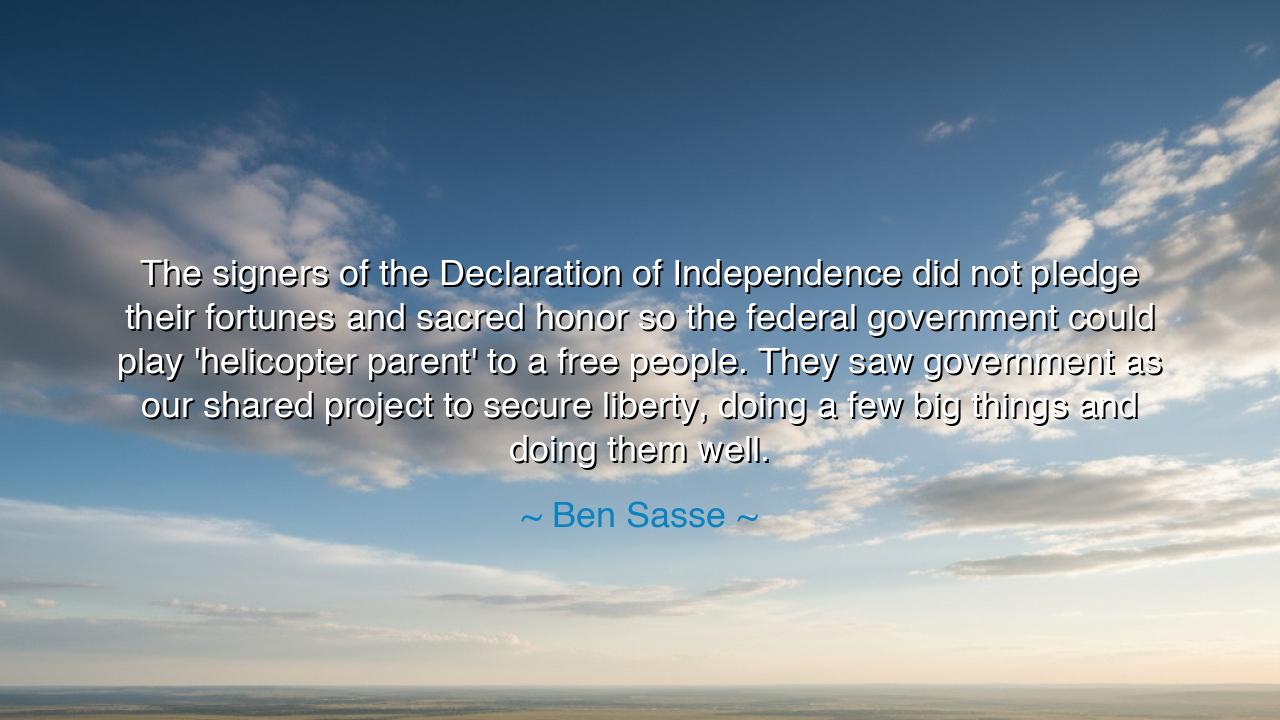
The signers of the Declaration of Independence did not pledge
The signers of the Declaration of Independence did not pledge their fortunes and sacred honor so the federal government could play 'helicopter parent' to a free people. They saw government as our shared project to secure liberty, doing a few big things and doing them well.






“The signers of the Declaration of Independence did not pledge their fortunes and sacred honor so the federal government could play ‘helicopter parent’ to a free people. They saw government as our shared project to secure liberty, doing a few big things and doing them well.” Thus spoke Ben Sasse, a statesman and thinker who sought to remind his generation of the ancient covenant between freedom and responsibility. In these words, he draws a line from the courage of the Founding Fathers to the conscience of every citizen — a call to remember that liberty is not a gift bestowed by rulers, but a trust guarded by the people. His statement is both a rebuke and a reminder: that a government born from the fires of independence must never become the overbearing master it once resisted.
To understand his meaning, one must return to that immortal summer of 1776, when fifty-six men gathered in Philadelphia to sign their names to the Declaration of Independence. They were not kings or conquerors, but ordinary men — farmers, merchants, scholars, and lawyers — yet in that moment, they became the architects of a new order. They pledged not comfort but sacrifice, not safety but honor, knowing full well that the penalty for failure was death. Their vision of government was clear and restrained: it was to be the servant of liberty, not its guardian; the protector of rights, not their source. Sasse’s words echo this founding truth — that a free people do not require a “helicopter parent” to guide every motion of their lives, for dependence is the slow death of freedom.
In the ancient world, philosophers and statesmen knew that liberty must be paired with virtue, or it would devour itself. The Greeks called it self-mastery, the Romans civic duty. A man who cannot govern himself, they said, will soon be governed by another. So too with nations: when a people forget how to live freely — when they ask their rulers to feed, comfort, and think for them — they exchange independence for indulgence. Sasse warns against this very danger, that the government, meant to be a guardian of order, becomes instead a caretaker of weakness, hovering over its citizens as if they were children. True freedom, he reminds us, is not comfort without consequence, but the noble risk of self-reliance.
Consider the story of George Washington, who after leading the Revolution, could have crowned himself king. The army adored him, the people trusted him — yet he chose restraint. He stepped down, surrendering power to the very republic he had helped create. His example was the living embodiment of what Sasse calls “doing a few big things and doing them well.” For Washington knew that a government’s greatness is not measured by how much it controls, but by how faithfully it preserves the conditions of freedom — justice, security, and peace. In that humility lay true strength, and in that restraint, the foundation of an enduring nation.
Sasse’s metaphor of the “helicopter parent” carries both humor and warning. It speaks of a government that hovers — anxious, watchful, overprotective — denying its people the freedom to fail, to learn, to grow. Yet liberty, like character, can only mature through responsibility. A nation too sheltered from consequence breeds citizens too timid to think or act. Thus, he urges a return to the wisdom of the founders: to a vision of governance that trusts its people, that limits its reach to what is necessary and noble — “doing a few big things,” such as defense, justice, and order, and doing them with excellence and restraint.
But his words are not merely political; they are moral. They remind us that freedom cannot survive without discipline. The Founders’ pledge of sacred honor was not a transaction of rights, but a vow of responsibility. They believed that liberty must be renewed by every generation — that each citizen must guard it with vigilance, labor, and virtue. When government grows large and citizens grow small, the spirit of independence fades, and the republic becomes a shadow of its promise. Therefore, Sasse calls not only for reform in policy, but for renewal in the human heart — for a revival of that fierce independence that once lit the lamps of freedom.
The lesson, then, is both timeless and urgent: cherish liberty, but earn it daily. Do not wait for government to solve every problem or soften every hardship. Strengthen your communities, educate your children, serve your neighbors, and live with the integrity that makes freedom possible. For a government that “does a few big things well” depends on a people who can do many small things with excellence. The Declaration of Independence was not the birth of a bureaucracy — it was the birth of a nation of individuals, each entrusted with the sacred task of self-government.
So remember, my child of freedom and inheritance: the signers did not pledge their lives so you might be watched, comforted, or managed — they pledged them so you might be free. Let your life honor their courage. Seek not ease, but purpose. Demand not more control, but more responsibility. For in the balance between liberty and order lies the destiny of every nation — and the fate of your own soul.






AAdministratorAdministrator
Welcome, honored guests. Please leave a comment, we will respond soon